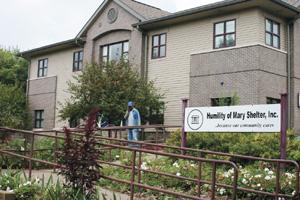
By Celine Klosterman
Joe Kirk, 47, is a hairdresser enrolled in Humility of Mary Shelter’s Permanent Housing Program in Davenport. A recent X-ray found something abnormal on his lung, and the state health-care program he’s enrolled in requires him to go to University of Iowa Hospitals and Clinics in Iowa City for follow-up. With no car, he relies on family in Muscatine to drive him the hour’s journey from Davenport. He laments the need for that trip, but said he feels lucky to get the health care he does.
He’s among those who’ve been served by programs that Humility of Mary Shelter, Inc. in Davenport offers. About 40 percent of clients served by the homeless shelter come in with no health insurance, said Cathy Jordan, a shelter service coordinator. The shelter can house 70 single men and women, and has been close to capacity all year.
Uninsured clients and other homeless people can receive basic care from Community Health Care. Its main clinic lies a few minutes from the Davenport shelter and offers a federally funded homeless outreach program at six Quad-City sites. The clinic employs only primary care providers, but coordinates care with specialists.
Specialist services are where IowaCare often comes in. The four-year-old state program, which Kirk and about 32,000 other Iowans are enrolled in, provides hospital and physician services for adults ages 19-64 who earn less than twice the federal poverty level and who don’t qualify for Medicaid. Patients who earn more than the federal poverty level pay a monthly premium based on their income, though exceptions are made for hardship.
The program receives about $42 million from the state and $68 million from the U.S. Centers for Medicare and Medicaid Services.
Humility of Mary Shelter clients — and all other Iowans living outside Polk County — can receive health benefits through IowaCare only at University of Iowa Hospitals and Clinics. “And the wait is terrible,” Jordan said, noting patients with non-life-threatening needs may wait 12-14 weeks. “If you have a daily struggle with lower-back pain and you’re told you can’t see an orthopedic specialist for 12 weeks, you’re looking at having to endure that for another three months,” Jordan said.
Addressing the wait time, university hospitals noted that only the IowaCare enrollees living in Polk County — about 9,000 — can seek care at Broadlawns Medical Center in Des Moines. It is the only other hospital available to patients through IowaCare. State officials are discussing expanding the provider network for enrollees in IowaCare, which is up for renewal next year.
At university hospitals, IowaCare patients with the greatest needs are seen soonest, and adjustments can be made if a patient’s condition changes, said Tom Moore, hospital media relations coordinator.
Transportation also poses an issue for some IowaCare patients. While Kirk relies on family, a university hospital-provided van picks up other patients by appointment. The van transports multiple people at a time to Iowa City, so Humility of Mary Shelter staffers try to prepare clients to wait there all day as fellow patients finish their appointments.
One former patient is Randy Schwarz, 55, an unemployed participant in Humility of Mary Shelter’s Housing First Program who has an Oct. 6 hearing regarding his application for Social Security disability benefits. Following a heart attack, he had double-bypass heart surgery at university hospitals in July, thanks to IowaCare.
But arranging transportation to Iowa City for follow-up three times weekly proved frustrating enough that he eventually quit going.
Communal transportation “is a good concept, but it doesn’t work out well for everyone,” Jordan said.
Still, she said she believes IowaCare patients are able to access the medical care they need. And she said only a few of her clients haven’t qualified for the program, often because their applications included incomplete or false information, or because the clients owed unpaid premiums from a previous period of enrollment in IowaCare. “If people are diligent, they can get it.”
The biggest hurdle, sometimes, is simply reaching homeless people who often are transient. “What we find is that as soon as we get people medical help — or any help — they have to start all over” when they move, Jordan said. Documents and identification cards get lost as people move in search of work or cheaper housing, and with no phone number or consistent address, people without a permanent home can be hard to reach. Mental health issues that affect memory can compound the problem, making it difficult for social service staffers to glean a client’s medical history. For such reasons, people often need to find a stable home before needs like health care can be fully addressed, Jordan said.
She rebutted complaints that helping homeless people with such needs enables them to remain homeless: “Homeless people will be here whether we assist them or not.” Echoing Catholic Social Teaching on human dignity and serving the poor and vulnerable, she added, “Let’s give them the dignity and respect they need.”








